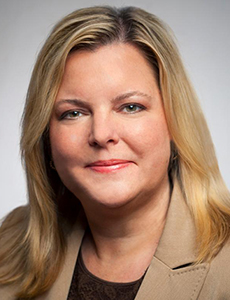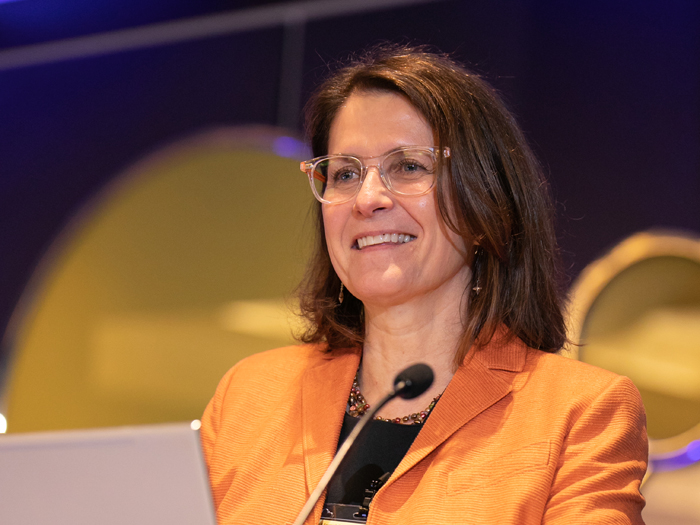Sponsored Content by QBE
QBE North America’s Kris Hill Breaks Down What You Need to Know About Alternative Markets

The alternative markets space is ripe with opportunity. When traditional insurance is unable or is unwilling to provide a solution, alternative markets is there for businesses’ risk management needs.
“Businesses needing to grow are definitely in need of alternative markets. Growth doesn’t always fit into a box,” said Kris Hill, president, alternative markets business, QBE North America.
Programs within the alternative market space are looking to solve for unique risks that don’t always fit into the “typical” P&C space. It takes talented underwriters to find such solutions and provide clients with the coverage and security they need to continue to conduct business.
For those interested in learning more about alternative market solutions, Hill sat down to discuss the ins and outs of what programs like these have to offer. Here’s what she had to say.
Risk & Insurance:: What is the alternative markets business? How do you describe it to the clients you serve?

Kris Hill, President, Alternative Markets Business, QBE North America
Kris Hill: When we think about alternative markets, it’s doing things outside the norm. We look at the insureds, the customers and their changing needs, and we look to find that alternative solution to manage their risk profile. I always say that I push alternative to the next level. I tell clients, “Tell me what it is you need to solve, and we’ll work it through.” With this in mind, our teams build trusted relationships to provide meaningful alternative risk, management and service solutions to meet the unique needs of our customers through three channels: programs, affiliated partners and our Westwood Insurance Agency.
R&I: What has your journey into alternative markets been like?
KH: My journey has been different —we could call the journey alternative itself — to get to where I am today. Most of my career was spent in finance and accounting, and I eventually moved over to the insurance side. From the beginning of my career, I really fell in love with the puzzle of insurance. Even in finance, I looked to find that piece of the puzzle that was going to make a difference to the business and a difference to our profitability.
At QBE, I used my playbook that I developed over time that positioned finance to really support the business. When the opportunity to step into the role of president of alternative markets came up, it was like the best of everything for me. When you think about the puzzle, the trusted relationships that we develop with partners and finding those unique solutions for customers was just the right thing for me personally and professionally.
R&I: Most recently you held the position of Chief Financial Officer for QBE. How has this role prepared you for alternative markets?
KH: The CFO spot really gave me a unique look at all the businesses within QBE. I was setting the strategy of what businesses to exit, what businesses to invest in. It gave me the ability to look at all the details of the alternative markets, look at the details of what was working, what wasn’t working, and enabled me to create a roadmap in my mind of what to focus on to really make alternative markets succeed and grow profitably.
R&I: What does the alternative markets program look like at QBE?
KH: When you look structurally at what alternative markets is at QBE, our program business accounts for the majority of alternative markets with about$1.2 billion in GWP. It’s where we delegate underwriting authority to businesses that have something unique, like a niche of the market that they’re underwriting, or some advanced technology, or they’ve got a unique distribution model. We write multi-line and mono-line coverage in 50 states on admitted and non-admitted bases, with a breadth of products including personal, commercial (P&C) and professional lines of coverage.
The other piece of alternative markets is personal lines. QBE works behind-the-scenes with our affiliated partners to distribute homeowners and renters insurance in a way that complements their business and enhances ease of doing business.
The third part of it is our Westwood Insurance Agency. They’re number 28 in all P&C agencies and focus mainly on homebuilders and provide us with a holistic view of the market.
R&I: Why is there a need for alternative solutions outside of the “typical” or the “norm?”
KH: Every insurance company decides the amount of risk they are willing to take. That can change over time, so carriers will get in and out of markets, creating a need to place that business. The underwriters are looking for ways to solve that issue, and alternative markets are there to provide the solution.
When you think about a program in an alternative market, it’s about combining risks that are unique. These unique risks and specialized underwriting have a need for the program business and alternative market, because the broad array of the P&C insurance industry isn’t as specialized.
R&I: What are the trends you seeing in the programs business today?
KH: Companies are de-risking based upon their own enterprise risk models, and underwriters that have been underwriting a certain type of business their entire career are having to find another place to go to support their clients. That’s bringing more brokers into the program space or expanding their program space.
There’s also private equity, which is saying to these talented underwriters, “We’ll provide you the capital. We’ll give you that boost that you need, whether it’s investing in technology to support you or bringing on the rest of the talent and underwriters that you need, but you’ve got to go get a carrier to back you.” That’s where we come in to back the talented underwriters that are starting new programs or wanting to expand where the carrier isn’t allowing them to expand.
And, of course, there is COVID to contend with and the impact it has already had. Some industries and programs are going to be hard hit. For example, restaurants, hotels, summer camps — things like that. There are programs that may not recover. But I will say that the programs I’ve seen have focused on technology and were up and running again within a week. We are more connected with them now than we were previous to COVID. While some programs are having some cashflow issues or the business is declined, others have been successful and will be able to ride out this wave of COVID.
So when I say COVID is impacting alternative market trends, I see both good and bad. There have been unique opportunities that are arising out of COVID and our current environment, because people are living in different ways. Take delivery services as an example. The delivery service industry has molded and adapted to this current environment, showing it’s just one way things are different in the way that we are living today. Those are the solutions we’re looking for.
R&I: Which trend is a key area to watch as we get closer to 2021 and beyond, and why?
KH: The one that is at the top of my mind the most is that private equity trend. Companies are looking for alternative ways to invest. The private equity trend is twofold, because private equity has been in the business for a while. First, some programs are looking for new ownership. Second, other programs are just starting out. They’re both looking for an alternative way of investing.
That’s where listening, learning and being a trusted partner comes in, because then we can connect the client with private equity and make sure the business survives whether it is backed by a carrier or not. QBE is out there in the marketplace really solutioning for the market, being that partner for these programs and getting the solution in the right place.
R&I: What type of programs are you and QBE focusing on?
KH: Program-wise, QBE is looking at size. Product-wise, we consider anything there to look at. We have a lot of talented program managers who are also talented underwriters willing to look at different aspects and finding solutions. We’re looking at diversifying our portfolio into things that matter for the future. We’re focused on good business, good programs and unique solutions. We want to learn about it and see if there’s a way that we can do business together. Partnership is key. We want good partners that have multiple programs with us and can grow with us, so that we may grow together.
R&I: What are some of the opportunities that you see for brokers and MGAs in the alternative market space?
KH: Brokers are salespeople. They connect the customer with the carrier. What an MGA does is bring part of the carrier into the broker shop. They have the underwriters there, too. And so there is a real opportunity for the brokers to expand their value to the customer.
The private equity piece also holds opportunity. I do think it could really change the way insurance is conducted, depending on how much investment is put into these MGAs that have the ability to focus on the customer and create a unique solution that program. When you think about access to the unique market, the unique customer, you think about the technology and Insurtech in there as well, bringing small companies together with programs. There’s an opportunity to really change the way that we do business and insurance.
R&I: What are some of the projects that you and your team are working on?
KH: I’m really excited about what we’re working on. Everybody thinks about traditional alternative markets as access programs. The tagline I heard when I came into this role was, “Everything in programs has probably been declined by an insurance carrier three times before it gets there, so you need that unique underwriting capability to write the business.”
We have a different mindset. Our mindset is about the customer and finding a solution. We want to be a trusted partner. We’re focused on elevating our level of partnership no matter who we talk to within alternative markets. For us, that isn’t just, “Oh, I got a program. Can you write the program?” We’re saying, “Okay, you’ve got a program. What are you servicing? What are your issues? How can we help you? How can we look at the market and grow your program?”
Our program managers become part of the program.
We recently announced a unique program with our partner, LeaseLock. Together with LeaseLock, we’re working to solve security deposit issues for the rental housing market. Renters have to pay, upfront, a security deposit in order to get their apartment, yet many people can’t afford it yet due to job circumstances. LeaseLock provides a unique solution for renters to pay via a monthly payment rather than a full security deposit.
That’s the type of alternative markets we’re working in. To us, it’s about finding that change in the environment, that change in customer need, and providing a unique solution rather than finding a piece of business that’s been declined so many times.
To learn more about alternative markets at QBE North America, visit: https://www.qbe.com/us/property-casualty
This article was produced by the R&I Brand Studio, a unit of the advertising department of Risk & Insurance, in collaboration with QBE North America. The editorial staff of Risk & Insurance had no role in its preparation.










